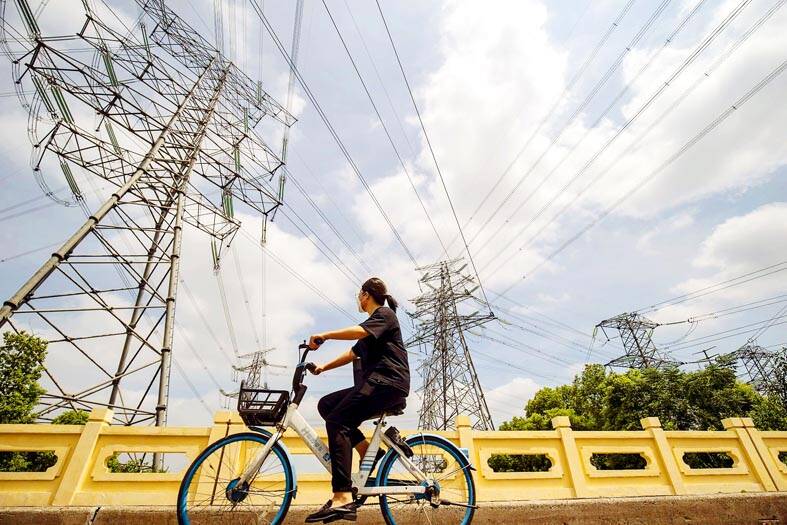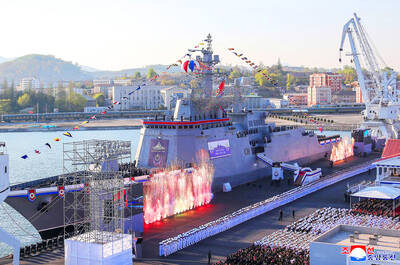Rain across central China this week is expected to relieve the country’s worst heat wave on record, but weather agencies are warning of potential floods, while analysts say the energy crisis exacerbated by the months-long drought is not over.
Almost half of China has been affected by the latest heat wave, the hottest since record-keeping began in 1961. Hundreds of temperature records have been broken, and the heat has exacerbated the effects of low rainfall, drying up rivers and reservoirs across the country.
Light to moderate showers have moved into central and southern China, and are expected to intensify this week, the China Meteorological Administration (CMA) said.

Photo: Bloomberg
Moderate to heavy rainfall is expected from southern Gansu Province down to Yunnan Province and across the drought-stricken Sichuan Basin, bringing a risk of flash floods, it said.
On Monday, more than 110,000 people in Sichuan Province had been relocated to safer areas.
After a period of significantly lower-than-average rainfall, some areas would now see up to twice as much rain as usual, the CMA said.
It said the rains would help replenish reservoirs, but still maintained drought warnings.
High temperatures are expected to ease today in southern China.
The heat wave sparked huge demand for electricity as hundreds of millions of people turned to air-conditioning, which has led to major power shortages. Across affected cities and provinces, authorities have suspended or rationed electricity supply to factories, shopping malls, high-rises and public transport.
Li Xi, a resident of central Chongqing, said that residents of his high-rise apartment block were able to use their air-conditioning, but areas outside the city and public spaces were rationed.
“Without [air-conditioning] it’s terrible at home... I just stay at home all day long and go out in the evening,” he said. “Chongqing city takes some measures to save the power — the supermarket is only open from 4pm to 9pm... Even on the subway the elevator is turned off, and we have to take the stairs.”
The heat, combined with power and water shortages, has had a debilitating effect on regional and farming areas, and on vulnerable groups including elderly people and those working outdoors.
The demand for electricity had overwhelmed provincial power grids, Trivium China analyst Andrew Polkand said, adding that another regional power crunch is “highly likely” in the coming winter.
A lack of water in the Yangtze River and dozens of tributaries, during what is supposed to be the wet season, has severely affected power supply in Sichuan — which draws 80 percent of its electricity from hydropower — and downstream regions, Polk said.
Cooler temperatures would lower household demand for electricity and ease the rationing of commercial and industrial power, but it would be temporary.
“Officials have had to uncork reservoirs to avert agricultural, river transport and ecological disasters,” Polk said.
“Chances are high that Sichuan will again run low on hydropower by year end — even if the heatwave ends immediately... Sichuan is now at such a water deficit that it would take a meteorological miracle to reach anything approaching normal levels for winter power production,” he said.
Analysts have said that centers such as Sichuan would probably have to boost reliance on energy from fossil fuel in the short term, until the development of renewable sources catch up.
The official People’s Daily newspaper yesterday warned of the need for regions to prepare for increasing extreme weather events driven by global heating, including drought and floods.

TRUMP EFFECT: The win capped one of the most dramatic turnarounds in Canadian political history after the Conservatives had led the Liberals by more than 20 points Canadian Prime Minister Mark Carney yesterday pledged to win US President Donald Trump’s trade war after winning Canada’s election and leading his Liberal Party to another term in power. Following a campaign dominated by Trump’s tariffs and annexation threats, Carney promised to chart “a new path forward” in a world “fundamentally changed” by a US that is newly hostile to free trade. “We are over the shock of the American betrayal, but we should never forget the lessons,” said Carney, who led the central banks of Canada and the UK before entering politics earlier this year. “We will win this trade war and

Kehinde Sanni spends his days smoothing out dents and repainting scratched bumpers in a modest autobody shop in Lagos. He has never left Nigeria, yet he speaks glowingly of Burkina Faso military leader Ibrahim Traore. “Nigeria needs someone like Ibrahim Traore of Burkina Faso. He is doing well for his country,” Sanni said. His admiration is shaped by a steady stream of viral videos, memes and social media posts — many misleading or outright false — portraying Traore as a fearless reformer who defied Western powers and reclaimed his country’s dignity. The Burkinabe strongman swept into power following a coup in September 2022

‘BODIES EVERYWHERE’: The incident occurred at a Filipino festival celebrating an anti-colonial leader, with the driver described as a ‘lone suspect’ known to police Canadian police arrested a man on Saturday after a car plowed into a street party in the western Canadian city of Vancouver, killing a number of people. Authorities said the incident happened shortly after 8pm in Vancouver’s Sunset on Fraser neighborhood as members of the Filipino community gathered to celebrate Lapu Lapu Day. The festival, which commemorates a Filipino anti-colonial leader from the 16th century, falls this year on the weekend before Canada’s election. A 30-year-old local man was arrested at the scene, Vancouver police wrote on X. The driver was a “lone suspect” known to police, a police spokesperson told journalists at the

North Korean leader Kim Jong-un has unveiled a new naval destroyer, claiming it as a significant advancement toward his goal of expanding the operational range and preemptive strike capabilities of his nuclear-armed military, state media said yesterday. North Korea’s state-run Korean Central News Agency (KCNA) said Kim attended the launching ceremony for the 5,000-tonne warship on Friday at the western port of Nampo. Kim framed the arms buildup as a response to perceived threats from the US and its allies in Asia, who have been expanding joint military exercises amid rising tensions over the North’s nuclear program. He added that the acquisition